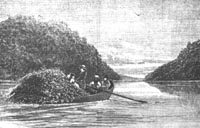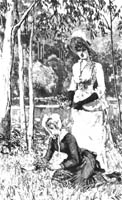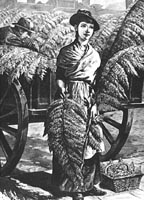Australian Christmas Plants
A number of Australian native plants have become significant as 'Christmas plants' in various parts of Australia. This is usually reflected in their local 'common names'.
The use of native plants as Christmas decoration last century can be seen from illustrations in the newspapers of the times.
A boatload of Christmas Bush (Ceratopetalum gummiferum)
being rowed towards Sydney for sale in the markets [Sydney Mail 23 December 1882] |
|
'Christmas Belles' the caption of an illustration of
young ladies collecting Christmas Bells (Blandfordia spp) from
the Illustrated Sydney News - Christmas Issue 1886. |
|
Tree Ferns (probably Dicksonia antarctica) were
also popular as Christmas decorations, as seen in the illustration by
Julian Ashton of a young lady selling fern fronds titled 'Christmas is
Coming' from the Illustrated Sydney News 20 December 1879. |
Christmas Bells
New South Wales
 Blandfordia
grandiflora (Blandfordiaceae) Liliaceae
Blandfordia
grandiflora (Blandfordiaceae) Liliaceae
(Syn. B. flammea)
A tufted plant with grass-like leaves to 50 cm. Flower spikes to 50 cm with
up to 10 large bell-like flowers, which vary from pure yellow to deep red
with yellow tips. Flowers usually occur in summer but occasional flowers appear
at any time of year.
Distribution: NSW, Qld.
Propagation: From seed.
Cultivation: A sandy soil with high water table is recommended for
commercial production of blooms, but plants will flower in a rockery provided
that ample water is available at all times. A full-sun position is also important.
Photo: Ron Hotchkiss © ANBG, A 5442
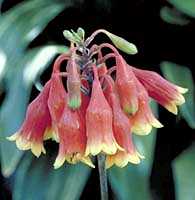 Blandfordia
nobilis (Blandfordiaceae) Liliaceae
Blandfordia
nobilis (Blandfordiaceae) Liliaceae
Similar to former species but generally smaller. Flowers appear in summer;
always red with yellow tips and cylindrical rather than funnel-shaped.
Distribution: NSW.
Propagation: From seed, flowers produced in third year.
Cultivation: Needs well-drained position in full sun or part shade.
Photo: Denise Greig © ANBG, A 6952
Christmas Bush
New South Wales
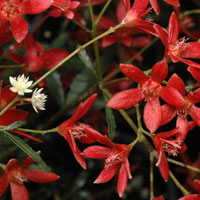 Ceratopetalum gummiferum Cunoniaceae
Ceratopetalum gummiferum Cunoniaceae
Erect shrub to 5 m high by 1.5 m diameter with light green, trifoliolate
leaves with lanceolate, toothed leaflets. Terminal sprays of white star-like
flowers occur in late spring followed by beautiful reddened, swollen calyces
in summer.
Distribution: NSW.
Propagation From seed or cuttings.
Cultivation Needs well-drained soil. A sunny position is preferred
for good flowering. Propagate from clones, which produce the best colours.
A fine feature plant and an excellent cut flower.
Photo: © M Fagg ANBG collection, A 2799
Christmas Bush
Victoria
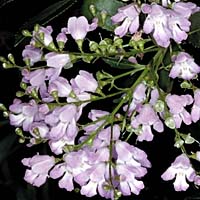 Prostanthera
lasianthos Lamiaceae
Prostanthera
lasianthos Lamiaceae
Variable shrub or small tree, from 2 m to 10 m high. Often has a compact
habit when in shrub form. Leaves are lanceolate to ovate, to 10 cm. Flowers
in terminal sprays, white, pink or mauve, occur in summer.
Distribution: Qld, NSW, ACT, Vic, Tas.
Propagation: From cuttings.
Cultivation: Probably the most adaptable species. Tolerates heavy shade
or full sun. Fast growing. Useful as a screen plant. A cultivar with variegated
leaves is known as P. lasianthos ÔMint IceÕ.
Photo: © M Fagg private
Christmas Bush
South Australia, Tasmania
 Bursaria
spinosa Pittosporaceae
Bursaria
spinosa Pittosporaceae
Erect, thorny shrub to 3 m and often taller. Dark green, obovate, shiny leaves
to 2.5 cm. Masses of white flowers cover bush in late spring and summer, followed
by attractive brown fruits.
Distribution: all States except WA.
Propagation: From cuttings or seed.
Cultivation: A very hardy plant that will grow in almost any situation.
Fruits are useful in floral arrangements. Subject to scale attack in some
areas.
Photo © M Fagg, AU 04/097
Christmas Orchid
Queensland
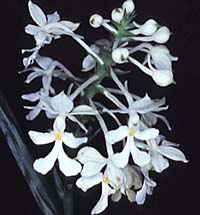 Calanthe
triplicata Orchidaceae
Calanthe
triplicata Orchidaceae
(Syn. C. veratrifolia)
Evergreen terrestrial orchid. Soft, obovate leaves to 90 cm. Showy white
flowers borne on erect spike to 150 cm in summer.
Distribution: Qld, NSW, South-east Asia.
Propagation: From seed or by division.
Cultivation: Readily grown in heavily shaded, moist but not badly drained
position in sheltered, warm garden. Excellent pot plant.
Photo: M Fagg © ANBG, O 394
Christmas Tree
Western Australia
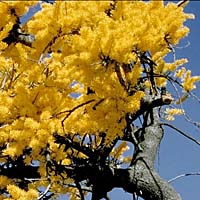 Nuytsia
floribunda Loranthaceae
Nuytsia
floribunda Loranthaceae
Parasitic tree to 10 m with variable foliage. Brilliant yellow flowers are
profuse in summer.
Distribution: WA.
Propagation: From seed or root cuttings.
Cultivation: Very difficult. Success has been achieved in Perth in
raising this plant to flowering stage. Young plants are also growing in the
eastern States. As the plant is partially reliant on a host plant for nutrition,
grasses and strawberries have been used as companion plantings. Further work
is required to fully understand the correct cultivation of this worthwhile
species. Needs full sun and appears to be frost resistant.
Photos from the National Plant Photographic Index, ANBG.
Text extracted from Australian Native Plants © John Wrigley and
Murray Fagg (1996)
![An Australian Government Initiative [logo]](/images/austgovt_brown_90px.gif)








